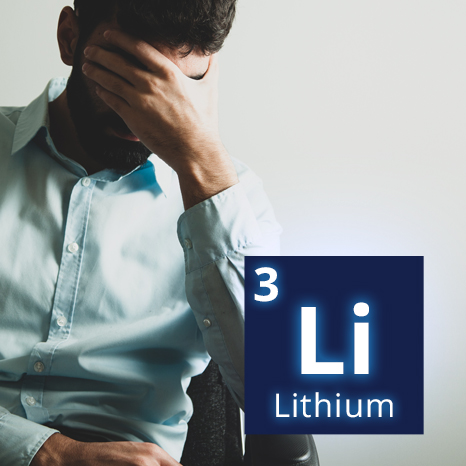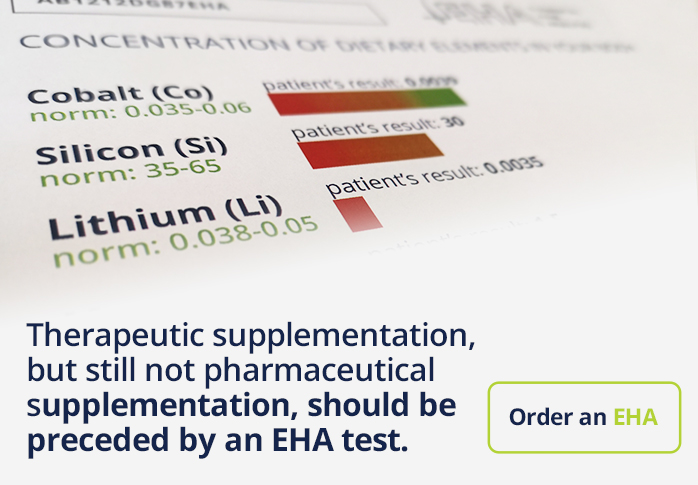 If your child starts having problems in both learning and behavior, it is worth thinking about lithium and checking whether its level in EHA is appropriate. This is especially true for children on the autism spectrum. Lithium is also very helpful in treating ADHD as well as post-traumatic stress or long-term chronic stress, such as chronic fatigue resulting from burnout. Lithium also helps in the fight against addictions such as alcoholism and drug addiction.
If your child starts having problems in both learning and behavior, it is worth thinking about lithium and checking whether its level in EHA is appropriate. This is especially true for children on the autism spectrum. Lithium is also very helpful in treating ADHD as well as post-traumatic stress or long-term chronic stress, such as chronic fatigue resulting from burnout. Lithium also helps in the fight against addictions such as alcoholism and drug addiction.
Low lithium levels are associated with a range of central nervous system (CNS) disorders:
- depression
- impulse control disorders
- mood disorders
- aggression
- drug addiction
- reduced fertility
- learning disabilities
- short stature
How to dose Lithium to supplement nutritional deficiencies?
Prophylactic lithium intake should be about 1 mg per day for an adult weighing 70 kg. This is just 0.1% of the dose of lithium commonly used as a pharmaceutical. Lithium doses as low as 150-500 mcg per day (doses that are more nutritious than pharmacological) have improved the mood of drug addicts, some of whom have had a long history of drug abuse. The supplementation of lithium is completely safe. No safety assessments or blood tests are needed for prophylactic lithium supplementation.It is different with therapeutic, but still not pharmaceutical, supplementation. This should be preceded by an EHA test. And the dosage for adults is up to 5 mg of lithium per day.
If the lithium value in the hair’s EHA is low or a person is only drinking purified deionized or reverse osmosis water, they should take lithium supplements. It is good practice to drink reverse osmosis water, which is essentially free of toxic chemicals as well as trace elements, provided that we are replenishing minerals. The mineralizers attached to the filters only supplement calcium and magnesium.
It is different when using lithium as a medicine. Lithium can be a toxic element. Therefore, increased amounts of lithium should be taken under medical supervision. The doses used range from 900 mg to 1,200 mg. Lithium has a very narrow therapeutic index. Slight changes in serum lithium levels may cause subtherapeutic or toxic effects. Serum lithium levels are affected by adherence to treatment, drug interactions, age, and comorbidities. The serum concentration range during treatment is 0.8-1.2 mmol / L, but lithium levels above 1.2 mmol / L may be toxic and levels above 2.0 mmol / L may be fatal.
Among the contraindications to the use of lithium is pregnancy – especially the first trimester, as it may harm the unborn child. A study by researchers from the Icahn School of Medicine at Mount Sinai showed that taking lithium as a drug in the first trimester of pregnancy may result in birth defects in the baby, so doctors suggest limiting the dose during this period or, if the patient’s condition allows it, completely discontinuing lithium during the first trimester of pregnancy, and resuming therapy shortly after delivery (this does not apply to prophylactic doses of lithium).
In babies of mothers who took lithium in the first trimester of pregnancy for bipolar disorder, birth defects, such as heart problems, occurred almost twice as often as in mothers who did not take lithium. However, no relationship between lithium intake and prematurity, the risk of gestational diabetes or low birth weight was found.
Another contraindication to the use of lithium is:
-
- Breastfeeding – this element may pass into food
- Cardiovascular diseases
- Severe renal failure
- Untreated hypothyroidism
- Uncontrolled hypertension
- Epilepsy
- Parkinson’s disease
- Addison’s disease
- Leukemia
Does the form of lithium matter?
Lithium as a drug is most often used in the form of lithium carbonate (Li2CO3). Bipolar disorder (BD) is a serious public health problem, with about a quarter of people suffering from ChaD attempting suicide. BD is characterized by cycles of manic and depressive moods, the relapses of which can be effectively limited by lithium therapy. Unfortunately, the most commonly used lithium salt, lithium carbonate (Li2CO3), is associated with many adverse health effects after long-term use: these adverse effects include relatively minor inconveniences such as nausea or polydipsia, i.e. pathologically excessive thirst and the consumption of very large amounts of fluids (up to 6 liters/day), which often correlates with polyuria.
As these adverse effects may limit patient compliance, an alternative lithium compound with a lower toxicity profile would dramatically improve treatment efficacy and outcomes. Such an alternative may be lithium orotate, a compound largely abandoned since the late 1970s. LiOr crosses the blood-brain barrier and penetrates into cells more easily than Li2CO3, which theoretically reduces dosage requirements and alleviates toxicity problems.
Lithium deficiency can have various health and personality consequences, not only psychiatric. Hence, lithium preparations have long been used as nutraceuticals (natural ingredients which are believed to have nutritional and health benefits). Various lithium preparations can be found on the OTC market without a prescription. Currently, the most commonly used preparation is lithium orotate. Lithium aspartate is also a popular form.
Lithium asparaginate is not recommended for people who are sensitive to excitotoxins such as monosodium glutamate (MSG). Aspartate (e.g. present in aspartame) is converted into glutamate in the body and can stimulate the nervous system. This is of great importance in children with ADHD and children with ASD.
A good form of lithium is lithium ion (liquid) which can bind easily with water to spread it more easily throughout the body. Charged minerals, especially electrolytes, also help maintain electrical gradients in cell membranes.
Lithium preparations are a good nutritional supplement, provided that they are used responsibly.The ease of access of lithium preparations contributes to their use by self-medicators, alternative medicine physicians and some physicians. The use of lithium requires in-depth studies of efficacy, tolerability and safety that are largely unavailable today. Responsible therapists do not recommend lithium therapy without performing an elemental hair analysis.
How can you increase lithium levels naturally?
Lithium is quite widespread in nature, but occurs mainly in the form of brines. The richest sources of lithium are in Chile and Australia. The main sources of lithium in the diet are mainly vegetables and grains. It can also be found in certain spices such as nutmeg, coriander seeds, or cumin. It’s a good habit to add lithium drops to smoothies or juices. The recreational dose is 500 mcg of lithium. The rest should be obtained from food and water.
Lithium salts can be found in some mineral and medicinal waters available on the Polish market. For example, in the water of Piwniczanka, the declared lithium content is 0.5 mg / l, and in the water of Franciszek (Wysowa) 6 mg / l, Szczawa I, dedicated to people struggling with stress, contains as much as 11.7 mg / l. Water from the Marie-Christine Nord spring in France contains 8 mg / l. In addition to the high lithium content, Szczawa I water also has more magnesium than calcium. Which is not without significance for the disturbed Ca:Mg ratio related to emotional and mental problems. However, due to the high content of bicarbonates, HCO3 should not be used in people with gastric acidity. Proper selection of mineral water to drink should be preceded by an interview and elemental hair analysis.
Why do we feel thirsty at night when taking lithium preparations?
As we already know, lithium blocks glycogen synthase kinase 3β (GSK3β), which in turn may increase blood glucose levels by blocking glycogen production.
When blood sugar levels are too high, the body puts pressure on the kidneys to produce more urine to get rid of the excess glucose. This makes us want to drink more, but we also use the toilet more often, e.g. at night.
What should I avoid while taking lithium?
When using lithium preparations, you should avoid drinking alcohol and using drugs. Alcohol can not only make the symptoms of bipolar disorder worse, but it can also increase the side effects caused by lithium, including dizziness and sleepiness. In addition, taking lithium while drinking alcohol may make the drug less effective, leading to greater mood swings.
It’s also important to avoid low-sodium diets and dehydration as this can increase your risk of lithium poisoning.
When taking lithium preparations, you should always consult a physician who uses ACE inhibitors, angiotensin receptor antagonists (sartans), and diuretics. Avoid taking lithium supplements and NSAIDs at the same time, e.g. ibuprofen, indomethacin, naproxen, piroxicam, aspirin and others.
NSAIDs can increase the levels of lithium in the blood, causing an increased risk of serious side effects such as confusion, tremors, slurred speech, and vomiting.
Caffeine can also make lithium less effective. It is recommended that you limit your caffeine intake (including tea, coffee, cola, and over-the-counter OCT or herbal caffeinated medications) while taking lithium. You should report any changes in mood or emotions to your doctor.
At what time of the day should lithium be taken?
Lithium is usually taken two to three times daily with food (sustained release formulations) or 3 to 4 times daily with food (conventional tablets / capsules / solution). Administration with food and more frequently during the day is associated with less gastrointestinal effects.
Can I play sports while taking lithium?
It’s a good idea to exercise regularly as long as you are getting enough fluids and salt. But you should try to avoid taking your lithium dose just before doing vigorous exercise.
How long can lithium preparations be taken?
If you have bipolar disorder, you may be given lithium for a longer period of time to prevent or reduce the risk of a relapse. Your doctor may suggest that you commit to taking lithium for at least six months, possibly longer. This is because it may take some time to ensure that the drug is working effectively.
The most common side effects of lithium include:
- Loss of appetite or nausea/vomiting
- Blurred vision
- Dizziness or drowsiness
- Shaking hands
- Dry mouth
- Excessive thirst
- Need to urinate frequently – polyuria/polydipsia
- Uncontrolled urination and increased intestinal motility
- Feeling light-headed or drowsy
- Confusion and/or lethargy
- Cognitive impairment
- Tremor, muscle weakness, twitching, spasms involving the face, tongue, eyes or neck
- Uncontrolled weight gain
- Sexual impairment
- Dermatological effects (acne and psoriasis)
Can long-term lithium intake cause permanent damage?
Ignoring or overlooking signs of toxicity, especially over time, can cause serious complications, including coma or death. Untreated cases of lithium poisoning can also lead to permanent complications such as brain damage, kidney damage, and serotonin syndrome.
With long-term use, lithium can cause chronic interstitial nephritis, which is characterized by a decrease in the glomerular filtration rate (GFR) and can lead to chronic kidney disease (lithium nephropathy).
Can lithium weaken muscles?
Muscle weakness develops early in lithium poisoning and can occur even at lithium levels below 2 mEq / L. Muscle hyperactivity includes convulsions, twitching, clonic movements of the entire limbs. Development of joint swelling / soreness and polyarticular pain that were not dose related.
Can you gain weight with lithium preparations?
According to a review article in Acta Psychiatrica Scandinavica, about 25% of people gain weight after taking lithium. After reviewing all relevant published medical studies, the authors recorded an average weight gain of 10 to 26 pounds among people who experience this side effect. Of course, this applies to lithium used as a drug in bipolar disorder.
Weight gain is a known undesirable side effect associated with the use of lithium. Limiting your calorie intake from drinks can help you avoid or minimize weight gain. Lithium can make you very thirsty. Replace sweet drinks or juices with water, flavored waters, other low-calorie or non-calorie drinks.
Diet should be the primary source of lithium, but if food is grown in lithium-poor soils, such as Europe, consider prophylactic lithium supplementation or fortification of food products. For example, hydroponic lettuce cultures containing molybdenum are planned for glycemic control. Many of us are not always aware that we live in a mineral-based world. And minerals are cofactors for thousands of metabolic processes. That is why it is worth checking how our body is mineralized and supplement these deficiencies before they turn into specific diseases.

Autor: Dr. Anna Romaniuk, microbiologist, immunologist, psycho-dietician
Bibliografia:
1. Fiona Coutts et all. The polygenic nature of telomere length and the anti-ageing properties of lithium. Neuropsychopharmacology. 2019 Mar; 44(4): 757–765
2. Xiaoyan Wu et all. Lithium ameliorates autistic-like behaviors induced by neonatal isolation in rats. Front Behav Neurosci. 2014; 8: 234
3. Tatavarty V et all. Autism-Associated Shank3 Is Essential for Homeostatic Compensation in Rodent V1. Neuron. 2020.
4. Mark Mintz and Emma Hollenberg. Revisiting Lithium: Utility for Behavioral Stabilization in Adolescents and Adults with Autism Spectrum Disorder. Psychopharmacol Bull. 2019 Jun 20; 49(2): 28–40
5. Francisco López-Muñoz i wsp. A History of the Pharmacological Treatment of Bipolar Disorder Int J Mol Sci. 2018 Jul; 19(7): 2143












